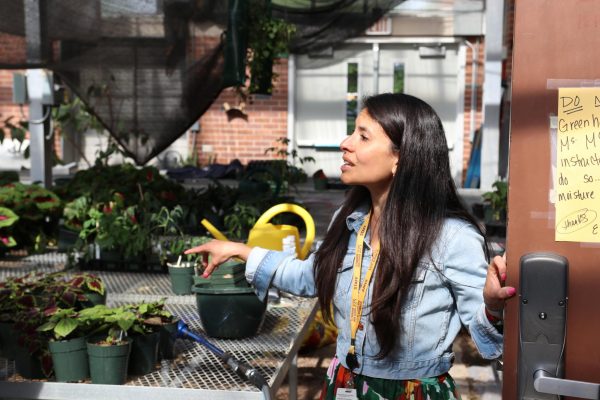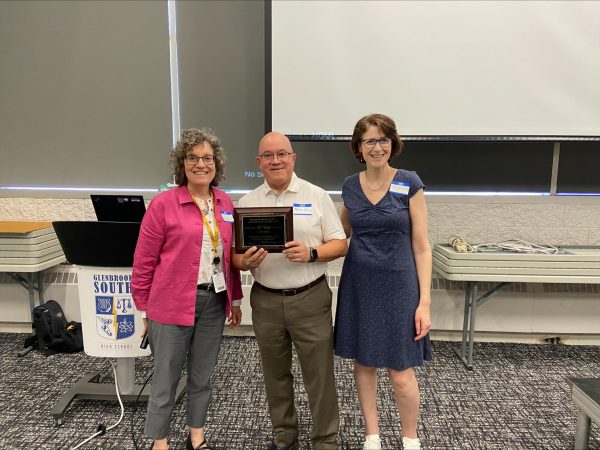District 225 gives snow days the cold shoulder
February 11, 2022
No longer will students enjoy snow days huddling indoors spending their day off watching movies as senior Madeline Gifargas once did. Now, when any Illinois public schools close due to inclement weather, emergency e-learning days will serve as a replacement to traditional cancelation of school until Nov. 19, 2023, an email from District 225 to District Families stated.
“Through Public Act 101-0012, the state of Illinois expanded the ability of schools to maintain student engagement with academic content through e-learning during emergency building closure such as inclement weather,” according to the district email.
The district outline plans for asynchronous assignments to be released to students by 9 a.m. on the day of the snow emergency, and those assignments will not be due until the next in-person class. In their Emergency E-Learning Plan, the district stated teachers will be present on Gmail and other platforms to assist students with any questions or assignments.
“Each student can complete assignments in any order and at whatever pace is appropriate for the individual learner,” according to the Board of Education e-learning plan. “While educators will be available on a set schedule, students can work on and submit lessons until the scheduled deadline as described in the e-learning day communication to parents.”
This change is a productive one, Daniel Rhoades, Social Studies Teacher, explained.
“The [emergency e-learning days] make a lot of sense,” Rhoades said. “There is so much that is disrupted by snow days, both in [class] curriculum and throughout the building.”
Rhoades said that emergency e-learning days will provide students and staff with a partial day off while still keeping classes on schedule. The change is especially beneficial for Advanced Placement (AP) classes as snow days can disrupt the tight schedule leading to AP tests in the spring, he explained.
“[Emergency e-learning days] will give students a bit of a break without sending [AP classes] off track,” Rhoades said.
Although Timothy Monahan, Physical Education Teacher, agrees emergency e-learning days are a good option, he said that as a parent he wishes his kids could still experience traditional, school-free snow days.
“One of the best parts of the winter growing up was the possibility of a snow day,” Monahan said. “[Snow days] were full of snow forts, sledding, and snowball fights, and unfortunately my [elementary aged kids] will still have school [during inclement] weather.”
For students, the switch to e-learning keeps students active during the day and limits the stress of catching up on work that snow days can bring, Gifargas noted.
“It gives us something to do during the day and lessens the stress of catching up the following school day,” Gifargas said.
However, Gifargas said she hopes substantial work, instead of busy work, is provided by teachers.
“The one [downside] is if we were given busy work because it feels like a waste of time, I’d rather complete something that we can normally do in class,” Gifargas said.
In addition to the introduction of emergency e-learning days, the district has adjusted their Covid-19 protocols since the Omicron variant emerged to prevent further spread of the virus, Johns said.
One adjustment is the expansion of the district’s vaccination program with Passport Health offering students, staff, and community members Moderna and Pfizer booster shots, Dr. R.J. Gravel, District 225 Associate Superintendent, explained. State and federal funding allow the schools to provide the shots free of cost, making the boosters accessible for all interested, he said.
“District 225 has been a leader in vaccination opportunities since January of 2021,” Gravel said. “We will continue to offer vaccination opportunities for our community as long as there is demand.”
Interim Principal Dr. Rosanne Williamson emphasized the school’s continued diligence in testing students returning from routine breaks in which they may have traveled or contracted the virus.
“Our next [round] of testing will be after spring break,” Williamson said. “We’re encouraging everyone to test whether they’re vaccinated or not.”
Since South returned from an adaptive pause on Jan. 6-7, the Illinois Department of Public Health (IDPH) and the Illinois State School Board of Education (ISBE) updated their school guidelines advising against using online learning amid teacher shortages on Jan. 13.
“Adaptive pauses using remote learning may not be employed due to staffing shortages in schools,” the IDPH and ISBE stated. “School closure should be the absolute last resort to managing an outbreak due to the critical role of in-person learning to students’ overall well-being.”
Despite staff shortages in January, cases of Covid-19 among South’s staff are currently low and most teachers are vaccinated, Johns said in a Board of Education meeting on Jan. 24. Any teachers who are unvaccinated must test negative weekly in order to teach in-person, he explained.
Johns emphasized that recent information received from the Cook County Department of Public Health (CCDPH) has also reduced staff shortages since teachers in quarantine must stay home for only five days instead of 10.
“[The five-day quarantine rule] has been extremely helpful in getting students back quickly, but more importantly, our staff was able to come back quickly as well,” Johns said.
As a result of the staff shortages South faced after winter break, the district has been working to hire 10 permanent substitute teachers to be on call, Williamson explained.
“We’re looking to hire 10 permanent [substitutes] who can be available that are employed by the district,” Williamson said. “That way on an everyday basis we can account for ten teachers being absent, especially when we’re in the pandemic.”
Gravel highlighted the value of paying attention to one’s health and regularly testing when experiencing any potential symptoms.
“It is extremely important to remain aware of our individual health at all times,” Gravel said. “If anyone is experiencing symptoms such as a headache, sore throat, or congestion, I strongly encourage them to take a test. Together we will get through this.”








